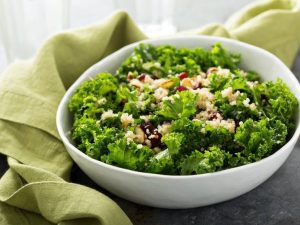Contains many essential vitamins and minerals, which may help promote health by providing antioxidants, fight heart disease and help prevent cancer (according to Insider)
Here are 7 scientifically proven benefits of adding salad to your diet.

1. Provides Antioxidants
American nutritionist Samantha Cassetty said: Lettuce is rich in antioxidants.
It is best to combine salads with other healthy foods such as whole grains, fruits, vegetables, and healthy fats.
Antioxidants help protect the body against damage from free radicals. Cassetty says free radicals can cause many health problems like cancer, Alzheimer’s disease and even heart disease.
Lettuce contains a number of important antioxidants – two cups of raw lettuce contain 1.2mg of beta-carotene – equivalent to 150% of the daily requirement, 38.4 mg of vitamin C – almost half of the daily requirement , chlorogenic acid and lutein.
2. Helps Fight Heart Disease
Dietitian Julie Stefanski, from the Academy of Nutrition & American cuisine, says the high fiber content of salads is a beneficial addition to the diet especially for people at risk of heart disease, (according to Insider).
Fiber can help lower cholesterol and change the way the body absorbs sugar, limiting weight gain, thereby boosting heart function and lowering blood pressure.
One cup of cooked lettuce has 5.2 grams of fiber, which is almost a fifth of the daily requirement.
Lettuce also contains a lot of phytxochemicals, compounds that fight heart disease by reducing inflammation in the body, Stefanski said.
3. Promotes Brain Health
Salads contain a number of nutrients that support brain health:
Omega-3 fatty acids: This substance may help improve memory and improve brain functioning, thanks to its anti-inflammatory effect on the brain.
Sulforaphane: This is a compound that fights the harmful effects of inflammation in the body. Reducing inflammation can help boost cognitive function.
Iron: Iron is also important for brain health. Low iron levels, which can lead to difficulty concentrating due to lack of oxygen supply to the brain, from the blood. Adding vitamin C along with iron helps to absorb iron more efficiently, so the high vitamin C content in salads is an important factor.
4. Provides Important Minerals
If you don’t like to eat vegetables, just eating salad can provide you with many vitamins and minerals even in moderate amounts, says Stefanski.
Getting enough minerals in the diet is important for maintaining the function of bones, muscles, heart and brain.
5. May Help Fight Cancer

Lettuce contains several important nutrients that may help reduce cancer risk
Antioxidants: The antioxidants in salads may help protect against cancer, says Cassetty, because oxidative stress can promote cancer growth. In particular, beta-carotene and lutein can help limit the growth of cancer cells, (according to Insider)
Sulforaphane: The sulfur compounds in cruciferous vegetables like lettuce and broccoli may help protect against cancer, says Cassetty. A meta-analysis of 13 studies found that eating more cruciferous vegetables reduced the risk of breast cancer.
Fiber: The high fiber content in salads — especially insoluble fiber — may help reduce the risk of colorectal cancer. This is because fiber passes through the colon quickly and can help eliminate cancer-causing compounds.
6. Excellent source of vitamin K
Lettuce is one of the highest plant sources of vitamin K, says Stefanski.
Sufficient vitamin K helps blood clot, aids the body in wound healing.
7. May Improve Digestion
Lettuce contains the sugar sulfoquinovose, which helps feed the good bacteria that live in the gut. These good bacteria are essential for digestion and help reduce levels of harmful bacteria. This is important because high levels of bad bacteria can lead to diarrhea and malnutrition.
The fiber in salads also adds bulk to stool, which can help relieve constipation.
However, to get these benefits, it’s best to combine salads with other healthy foods like whole grains, fruits, vegetables, and healthy fats.






